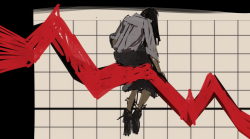This Tuesday signified a landmark victory for copyright integrity and intellectual property security worldwide. The Recording Industry Association of America settled with Brianna LaHara, a resident of a Manhattan housing project. Like many who fall between the cracks of society and turn to crime, LaHara led a double life. By day, she attended middle school and was on the honor roll. By night, she was one of the nation’s most wanted music pirates.
Brianna, age 12, didn’t smoke, didn’t drink, and didn’t get into fights. No, what she did was worse. Much worse. By using software such as KazAA to share music files, Brianna helped contribute to the financial ruin of many of today’s most beloved musicians.
Who is really to blame here? Did Brianna contribute to the poverty of artists such as Justin Timberlake and Britney Spears because she was bitter about having to live in the projects? Perhaps she simply didn’t know right from wrong. Or maybe she is part of an Al Qaeda sleeper cell. Regardless of her motives or intentions though, the RIAA has made it clear that such behavior is indeed illegal, and will not be tolerated.
And so, Brianna’s mother, Sylvia, will have to find a way to pay the $2000 settlement. It will serve Brianna well to go without dinner, as she thinks about what she has done to the artists that she claims to “love.” She definitely will not be downloading any more songs. And she certainly won’t be buying any albums for that matter either.
Perhaps more alarming than the case of Brianna LaHara is that she is but one of millions of Americans who commit copyright theft at an alarming rate. Hundreds of millions of songs are “traded” daily worldwide across the seedy underbelly of the Internet. Each day; more people log on to peer-to-peer networks than voted for George W. Bush in the 2000 election. The RIAA is working hard to track down and bring all of these criminals to justice, but they need your help.
Do not let these criminals fool you into thinking that there is such a concept as “fair use.” This is a myth, propagated by far-left liberals who feel that all people are somehow entitled to free music under some sort of “socialized music system.” This is simply not the American way. It is unpatriotic to steal music; it goes against the fabric of our nation. When you download that Beatles track, or that new song by Beyonce, you’re helping the terrorists. In fact, when you listen to that digital copy of Yellow Submarine, the terrorists have already won.
But why is there no Orange Alert? Where are the black helicopters? Why haven’t John Ashcroft’s death squads been deployed? One word: liberals. The ACLU, the Democratic Party, the EFF, AARP, NOW and just plain guys from Massachusetts have dedicated themselves to defending those who support “free music” at the expense of the recording industry and the artists.
How is this fair? How can an artist be expected to survive on an income less than that of the President of the United States? Writing music, touring, recording albums and filming music videos is just as stressful, if not more, than running the free world.
The RIAA has worked hard to convince the public that sharing music is wrong. However, the people have not absorbed the message. File sharing continues, at an increasing rate. While taking down ringleaders such as Brianna represents progress in the War on Sharing, the autonomous structure of the peer-to-peer “community” allows the body to survive the severing of the head.
And thus, the options remaining at the RIAA’s disposal are running out. This is the zero hour. Soon RIAA President Cary Sherman will announce the first shots being fired in Operation Enduring Copyright. The mission is clear, destroy the Internet. Send the creation of super-liberal Al Gore back to hell, from whence it came.
It will not be easy, yet it is clear there are few alternatives. For in this case, the clich? “adapt or die” is particularly applicable. The Internet has not adapted to the needs of the RIAA. While some of those liberals may say, “the RIAA should adapt to the Internet,” that is just simply crazy. The RIAA was here first.
However, some small steps have been made to try to encourage rogue file-sharers to come clean, and to see the light. The recent launch of the iTunes music store is one example, yet it is limited only to Mac users, who are generally wealthy, and would not be illegally downloading music in the first place. Universal has also talked about lowering the suggested retail price of albums to $12.98, but for children like Brianna living in the projects, she might as well be trying to afford crack.
The RIAA recognizes there is no simple solution short of destroying the Internet. And, because of the nature of large industry trade groups, no time can be spent searching for a complex solution that can’t be marketed in a succinct three-word phrase. So it becomes clear, the RIAA must act, and it must act soon.
A world without illegal file sharing can be a reality. Call or write your representatives in Congress, telling them to support legislation that would outlaw altogether the use of the Internet. Tell them you want a world without pirates, and make sure to stress that there should be no greater priority than to stop the flow of black-market Eminem tracks.
If we do not act soon, the liberals will have their way, and we will live in a world without borders, a world without boundaries and a world without copyrights. It is a bleak future, but one that can be avoided. Remember, if you don’t turn in your friend who file shares, who will? And when Lars Ulrich can no longer afford fuel for his solid gold rocket car, Osama might as well raise the Saudi flag over the White House.
Dave Stroup is a sophomore in the College and voices editor of The Georgetown Voice. For reasons not related to the RIAA, he considers himself the luckiest.




